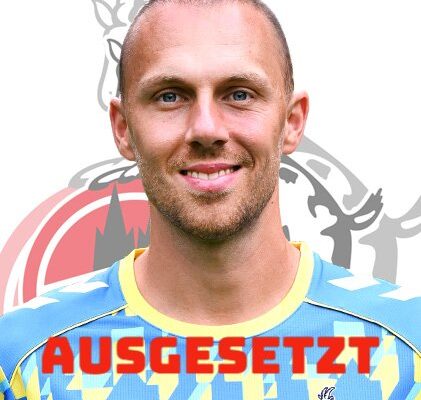In the world of professional football, discipline and punctuality are often seen as the cornerstones of a successful team. Coaches and managers strive to instill these values in their players, understanding that the difference between victory and defeat can often hinge on the smallest details—discipline being chief among them. For Lukas Kwasniok, the head coach responsible for leading his team through rigorous training sessions and competitive fixtures, the rules are clear and non-negotiable. When a player fails to adhere to these standards, the consequences can be severe.
Recently, the spotlight fell on Marvin Schwäbe, a goalkeeper known for his skill and reflexes, but now also infamous for his failure to arrive on time for training. The issue was not a minor infraction or a single lapse in judgment; rather, it was a display of gross negligence that did not sit well with the coach or the club’s leadership. Schwäbe’s repeated tardiness culminated in a disciplinary action that sent ripples throughout the team and the wider football community—a two-game suspension imposed by Kwasniok himself, underscoring the seriousness with which punctuality is regarded.
The saga began during the early weeks of the preseason, a period typically marked by intense preparation and a renewed focus on physical conditioning and tactical discipline. Training sessions were scheduled strictly, with players expected to arrive well before the start time to engage in warm-ups, team meetings, and drills. For a professional athlete, such punctuality is expected as a baseline requirement—something that reflects not only respect for the team and coaching staff but also personal commitment to excellence.
However, Marvin Schwäbe’s record began to show signs of strain. On several occasions, he arrived late to training sessions, disrupting the flow of preparation and raising concerns among the coaching staff. Initially, these incidents were met with warnings and reminders, as Kwasniok believed that Schwäbe might be dealing with unforeseen circumstances or personal issues. Yet, as the days passed, it became clear that this was not a matter of isolated delays but a pattern of behavior signaling negligence.
The situation escalated when Schwäbe missed a critical team meeting scheduled before a particularly demanding training session. His absence was noticed immediately, causing confusion and a delay in proceedings. When questioned, Schwäbe cited transportation issues and personal distractions, but these explanations failed to satisfy Kwasniok or the team management. Punctuality was not just a rule—it was a principle, a reflection of professionalism that each player was expected to uphold without exception.
Frustrated by the repeated breaches of discipline, Lukas Kwasniok convened a meeting with Schwäbe, making it clear that such conduct was unacceptable and would not be tolerated going forward. The coach emphasized that punctuality was not merely about showing up on time; it was about accountability, respect for teammates, and dedication to the collective goals of the club. Schwäbe acknowledged the mistake and promised to rectify his behavior, but the coach remained wary.
The breaking point came when Schwäbe arrived late yet again, this time missing the start of a crucial tactical drill session. This particular training was designed to fine-tune defensive strategies and communication—a session where the goalkeeper’s role was pivotal. His tardiness compromised the entire session, forcing Kwasniok to make a decision that would serve as both a corrective measure and a message to the squad.
In a formal disciplinary move, Kwasniok announced that Schwäbe would be suspended for two games due to gross negligence related to his punctuality. This decision was met with mixed reactions within the club and among fans. Some viewed it as a strict but necessary enforcement of discipline, while others sympathized with Schwäbe, believing the punishment to be harsh for what might seem like a minor offense.
Despite the divided opinions, Kwasniok stood firm. The suspension was not just about punishment; it was about reinforcing the culture and standards that the team needed to succeed. For him, the stakes were too high to allow complacency or leniency to take root. The coach believed that every member of the squad, regardless of their status or position, must embody the values of professionalism and responsibility.
The suspension had immediate consequences for the team’s dynamics. Schwäbe, sidelined for two matches, had to watch from the stands as his teammates took to the field without him. This period of reflection was intended to serve as a wake-up call—a time for him to reconsider his priorities and recommit to the team’s ethos. For the coaching staff, it was a chance to observe how the team adapted in his absence and whether the message about punctuality and discipline was resonating more broadly.
Throughout this period, Schwäbe was encouraged to attend training sessions and team meetings but under close scrutiny. His efforts to make amends were noted, and he appeared to demonstrate a renewed focus and commitment. The suspension was not meant to alienate him but to provide a structured consequence that could foster growth and accountability.
The story of Schwäbe’s suspension became a talking point beyond the club, sparking discussions among analysts, journalists, and fans about the role of discipline in sports. Some praised Kwasniok’s uncompromising stance, highlighting how maintaining strict standards is essential in professional environments. Others debated whether such disciplinary measures might undermine player morale or be counterproductive if not managed carefully.
In the end, the incident served as a valuable lesson in leadership and team management. It underscored the importance of clear communication, consistent enforcement of rules, and the willingness of coaches to make difficult decisions for the greater good. For players like Schwäbe, it was a reminder that talent alone is not enough; professionalism and respect for the game’s demands are equally critical components of success.
Looking ahead, the hope within the club is that Schwäbe will emerge from this episode stronger and more disciplined, ready to contribute fully to the team’s ambitions. The two-game suspension, while a setback, represents an opportunity for personal growth and renewed dedication.
In the high-pressure environment of professional football, where every second counts and every decision has consequences, punctuality is more than just arriving on time—it is a reflection of character, a demonstration of respect, and a fundamental building block of team unity. Lukas Kwasniok’s decision to suspend Marvin Schwäbe serves as a potent reminder that in the pursuit of excellence, no detail is too small to be overlooked, and no player is above the standards that define true professionalism.



